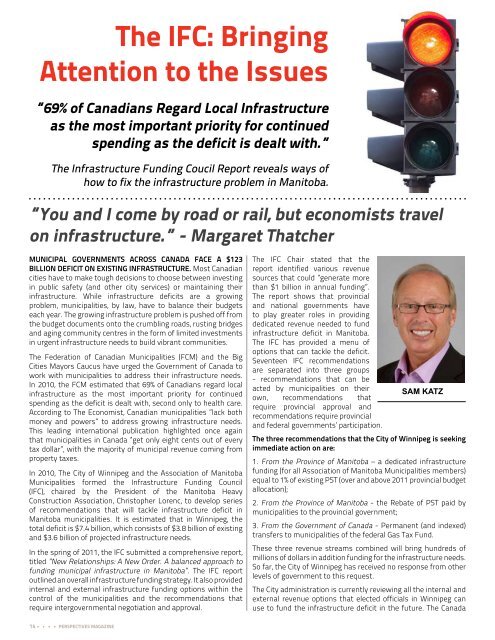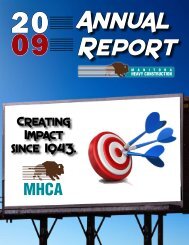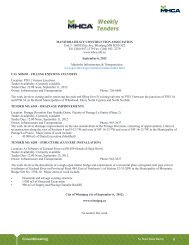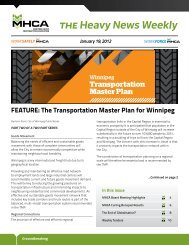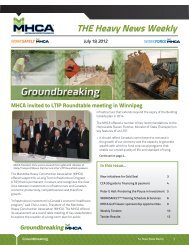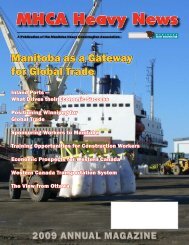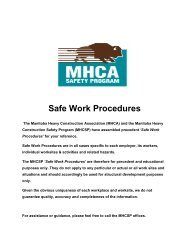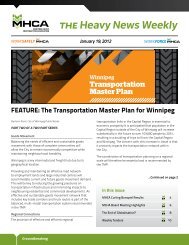2012 Perspectives Magazine - Manitoba Heavy Construction ...
2012 Perspectives Magazine - Manitoba Heavy Construction ...
2012 Perspectives Magazine - Manitoba Heavy Construction ...
Create successful ePaper yourself
Turn your PDF publications into a flip-book with our unique Google optimized e-Paper software.
The IFC: Bringing<br />
Attention to the Issues<br />
“69% of Canadians Regard Local Infrastructure<br />
as the most important priority for continued<br />
spending as the deficit is dealt with.”<br />
The Infrastructure Funding Coucil Report reveals ways of<br />
how to fix the infrastructure problem in <strong>Manitoba</strong>.<br />
“You and I come by road or rail, but economists travel<br />
on infrastructure.” - Margaret Thatcher<br />
Municipal governments across Canada face a $123<br />
billion deficit on existing infrastructure. Most Canadian<br />
cities have to make tough decisions to choose between investing<br />
in public safety (and other city services) or maintaining their<br />
infrastructure. While infrastructure deficits are a growing<br />
problem, municipalities, by law, have to balance their budgets<br />
each year. The growing infrastructure problem is pushed off from<br />
the budget documents onto the crumbling roads, rusting bridges<br />
and aging community centres in the form of limited investments<br />
in urgent infrastructure needs to build vibrant communities.<br />
The Federation of Canadian Municipalities (FCM) and the Big<br />
Cities Mayors Caucus have urged the Government of Canada to<br />
work with municipalities to address their infrastructure needs.<br />
In 2010, the FCM estimated that 69% of Canadians regard local<br />
infrastructure as the most important priority for continued<br />
spending as the deficit is dealt with, second only to health care.<br />
According to The Economist, Canadian municipalities ”lack both<br />
money and powers” to address growing infrastructure needs.<br />
This leading international publication highlighted once again<br />
that municipalities in Canada “get only eight cents out of every<br />
tax dollar”, with the majority of municipal revenue coming from<br />
property taxes.<br />
In 2010, The City of Winnipeg and the Association of <strong>Manitoba</strong><br />
Municipalities formed the Infrastructure Funding Council<br />
(IFC), chaired by the President of the <strong>Manitoba</strong> <strong>Heavy</strong><br />
<strong>Construction</strong> Association, Christopher Lorenc, to develop series<br />
of recommendations that will tackle infrastructure deficit in<br />
<strong>Manitoba</strong> municipalities. It is estimated that in Winnipeg, the<br />
total deficit is $7.4 billion, which consists of $3.8 billion of existing<br />
and $3.6 billion of projected infrastructure needs.<br />
In the spring of 2011, the IFC submitted a comprehensive report,<br />
titled ”New Relationships: A New Order. A balanced approach to<br />
funding municipal infrastructure in <strong>Manitoba</strong>”. The IFC report<br />
outlined an overall infrastructure funding strategy. It also provided<br />
internal and external infrastructure funding options within the<br />
control of the municipalities and the recommendations that<br />
require intergovernmental negotiation and approval.<br />
The IFC Chair stated that the<br />
report identified various revenue<br />
sources that could ”generate more<br />
than $1 billion in annual funding”.<br />
The report shows that provincial<br />
and national governments have<br />
to play greater roles in providing<br />
dedicated revenue needed to fund<br />
infrastructure deficit in <strong>Manitoba</strong>.<br />
The IFC has provided a menu of<br />
options that can tackle the deficit.<br />
Seventeen IFC recommendations<br />
are separated into three groups<br />
- recommendations that can be<br />
acted by municipalities on their sam katz<br />
own, recommendations that<br />
require provincial approval and<br />
recommendations require provincial<br />
and federal governments’ participation.<br />
The three recommendations that the City of Winnipeg is seeking<br />
immediate action on are:<br />
1. From the Province of <strong>Manitoba</strong> – a dedicated infrastructure<br />
funding (for all Association of <strong>Manitoba</strong> Municipalities members)<br />
equal to 1% of existing PST (over and above 2011 provincial budget<br />
allocation);<br />
2. From the Province of <strong>Manitoba</strong> - the Rebate of PST paid by<br />
municipalities to the provincial government;<br />
3. From the Government of Canada - Permanent (and indexed)<br />
transfers to municipalities of the federal Gas Tax Fund.<br />
These three revenue streams combined will bring hundreds of<br />
millions of dollars in addition funding for the infrastructure needs.<br />
So far, the City of Winnipeg has received no response from other<br />
levels of government to this request.<br />
The City administration is currently reviewing all the internal and<br />
external revenue options that elected officials in Winnipeg can<br />
use to fund the infrastructure deficit in the future. The Canada<br />
14 perspectives <strong>Magazine</strong>


